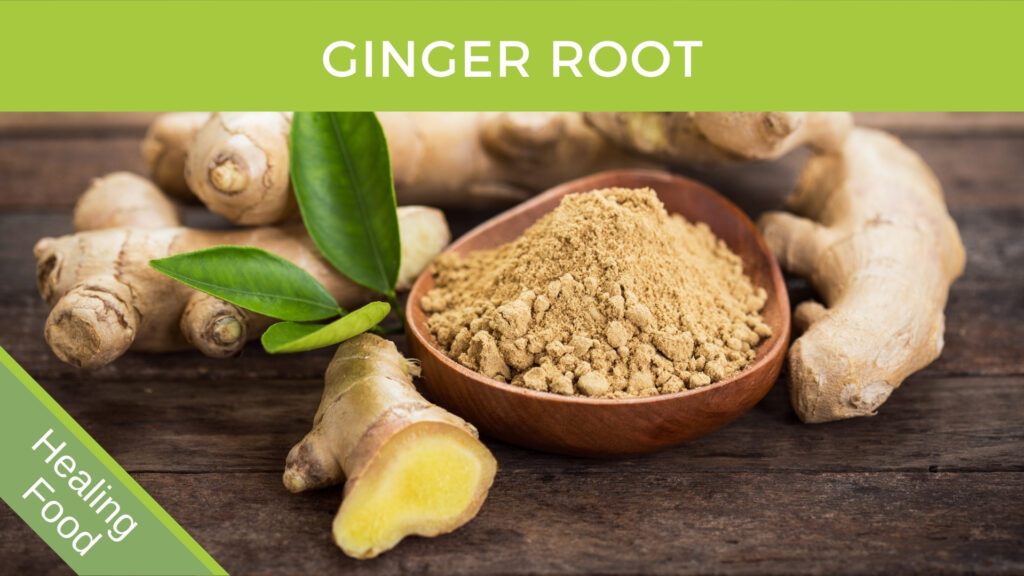- 9 months ago
- 7Minutes
- 1569Words
- 480Views
Ginger is one of my all-time favorite herbs just like the others we use in the Ultimate Herbal Health Program.
Ginger can be found in these Ultimate Herbal Health products:
I use mainly it for its digestive benefits but also because it helps with heart health, circulation and blood pressure.
Find out the history and evidence for this below.
(1) Wikipedia https://en.wikipedia.org/wiki/Ginger
(2) Zingiber officinale (ginger). Monograph. Pubmed http://www.ncbi.nlm.nih.gov/pubmed/?term=12946242
(3) Tyler VE. Some recent advances in herbal medicine. Pharm Int 1986;7:203-207. http://www.altmedrev.com/publications/8/3/331.pdf
(4) Grontved A, Brask T, Kambskard J, Hentzer E. Ginger root against seasickness. A controlled trial on the open sea. Acta Otolaryngol 1988;105:45-49. http://www.altmedrev.com/publications/8/3/331.pdf
(5) Riebenfeld D, Borzone L. Randomized double-blind study comparing ginger (Zintona‚) and dimenhydrinate in motion sickness. Healthnotes Rev 1999;6:98-101. http://www.altmedrev.com/publications/8/3/331.pdf
(6) Careddu P. Motion sickness in children: results of a double-blind study with ginger (Zintona‚) and dimenhydrinate. Healthnotes Rev 1999;6:102-107. http://www.altmedrev.com/publications/8/3/331.pdf
(7) Mowrey DB, Clayson DE. Motion sickness, ginger, and psychophysics. Lancet 1982;1:655- 657. http://www.altmedrev.com/publications/8/3/331.pdf
(8) Schmid R, Schick T, Steffen R, et al. Comparison of seven commonly used agents for prophylaxis of seasickness. J Travel Med 1994;1:203-206. http://www.altmedrev.com/publications/8/3/331.pdf
(9) Protective effects of the standardized extract of Zingiber officinale on myocardium against isoproterenol-induced biochemical and histopathological alterations in rats. Pubmed http://www.ncbi.nlm.nih.gov/pubmed/25868620
(10) Inhibition of human low-density lipoprotein oxidation in vitro by ginger extracts. PubMed http://www.ncbi.nlm.nih.gov/pubmed/24404979
(11) Ethanolic Zingiber officinale R. extract pretreatment alleviates isoproterenol-induced oxidative myocardial necrosis in rats. PubMed http://www.ncbi.nlm.nih.gov/pubmed/17205709
(12) The Effect of Ginger (Zingiber officinale) on Platelet Aggregation: A Systematic Literature Review. PubMed http://www.ncbi.nlm.nih.gov/pubmed/26488162
(13) Ginger lowers blood pressure through blockade of voltage-dependent calcium channels. PubMed http://www.ncbi.nlm.nih.gov/pubmed/15613983
(14) Cardiovascular effects of ginger aqueous extract and its phenolic constituents are mediated through multiple pathways. PubMed http://www.ncbi.nlm.nih.gov/pubmed/16157513
(15) A review of the gastroprotective effects of ginger (Zingiber officinale Roscoe). PubMed http://www.ncbi.nlm.nih.gov/pubmed/23612703
(16) Ginger: Health benefits and dietary tips. https://www.medicalnewstoday.com/articles/265990.php
(17) Gastroprotective Effect of Ginger Rhizome (Zingiber officinale) Extract: Role of Gallic Acid and Cinnamic Acid in H+, K+-ATPase/H. pylori Inhibition and Anti-Oxidative Mechanism. PUBMED https://www.ncbi.nlm.nih.gov/pmc/articles/PMC3136331/
(18) Prevention of allergic rhinitis by ginger and the molecular basis of immunosuppression by 6-gingerol through T cell inactivation. PUBMED https://www.ncbi.nlm.nih.gov/pubmed/26403321
(19) Active Components of Ginger Potentiate β-Agonist–Induced Relaxation of Airway Smooth Muscle by Modulating Cytoskeletal Regulatory Proteins. PUBMED https://www.ncbi.nlm.nih.gov/pmc/articles/PMC3930933/
(20) Ginger Extract Ameliorates Obesity and Inflammation via Regulating MicroRNA-21/132 Expression and AMPK Activation in White Adipose Tissue. PUBMED https://www.ncbi.nlm.nih.gov/pmc/articles/PMC6266584/
(21) Ginger (Zingiber officinale Roscoe) in the Prevention of Ageing and Degenerative Diseases: Review of Current Evidence. PUBMED https://www.ncbi.nlm.nih.gov/pmc/articles/PMC6721508/
(22) Promoting Plant-Based Therapies for Chronic Kidney Disease. PUBMED https://www.ncbi.nlm.nih.gov/pmc/articles/PMC8902019/
Description
A popular hot, fragrant kitchen spice used widely in cooking. Its popularity both as a food, a spice, a flavor and as herbal medicine speaks for itself. Every freezer should contain whole ginger root and every pantry some ground ginger.
Mature ginger rhizomes are fibrous and nearly dry. The juice from the roots is often used as a spice in Indian recipes and is a common ingredient of Chinese, Korean, Japanese, Vietnamese, and many South Asian cuisines for flavoring dishes such as seafood, meat, and vegetarian dishes (1)
Traditional Uses
In India ginger is a central ingredient in sauces in many vegetarian and meat-based dishes, especially curries, plus it has a role in traditional Ayurvedic medicine. Ginger is also consumed in candied and pickled form. Tea can be made using ginger. (1)
In Japan, ginger is pickled to make beni shoga and gari or grated and used raw on tofu or noodles. It is made into a candy called shoga no sato zuke. (1)
In the traditional Korean kimchi, ginger is either finely minced or just juiced to avoid the fibrous texture and added to the ingredients of the spicy paste just before the fermenting process. (1)
Ginger has a long history of medicinal use dating back 2,500 years in China and India for conditions such as headaches, nausea, rheumatism, and colds. (2)
Characterized in traditional Chinese medicine as spicy and hot, ginger is claimed to warm the body and treat cold extremities, improve a weak and tardy pulse, address a pale complexion, and strengthen the body after blood loss. (2)
During cold weather, drinking ginger tea is a good way to keep warm. It is diaphoretic, which means that it promotes sweating, working to warm the body from within. A great home remedy to ward off the coughs and colds. (16)

The rhizomes have been used since antiquity in the various traditional systems of medicine to treat arthritis, rheumatism, sprains, muscular aches, pains, sore throats, cramps, hypertension, dementia, fever, infectious diseases, catarrh, nervous diseases, gingivitis, toothache, asthma, stroke, and diabetes. (15)
Ginger is also used as a home remedy and is of immense value in treating various gastric ailments like constipation, dyspepsia, belching, bloating, gastritis, epigastric discomfort, gastric ulcerations, indigestion, nausea and vomiting, and scientific studies have validated the traditional uses. (15)
Ginger is also shown to be effective in preventing gastric ulcers induced by nonsteroidal anti-inflammatory drugs [NSAIDs like indomethacin, aspirin], reserpine, ethanol, stress (hypothermic and swimming), acetic acid and Helicobacter pylori-induced gastric ulcerations in laboratory animals. (15)
Active Constituents
Ginger contains a number of pungent constituents and active ingredients. Steam distillation of powdered ginger produces ginger oil, which contains a high proportion of sesquiterpene hydrocarbons, predominantly zingiberene.3
The major pungent compounds in ginger have yielded potentially active gingerols, which can be converted to shogaols, zingerone, and paradol. The compound 6-gingerol appears to be responsible for its characteristic taste. Zingerone and shogaols are found in small amounts in fresh ginger and in larger amounts in dried or extracted products. (2)
Therapeutic actions & Clinical Studies
Ginger has been reported to exert anti-obesity, anti-oxidant and anti-ulcer, anti-inflammatory, anti-tumor, carminative, diaphrodic and digestive, expectorant, as well as gastroprotective activities. (17)
Fat Metabolism
In one study with rats, findings suggest that ginger inhibits body weight gain and adipose tissue on a high-fat diet. Additionally, ginger reduces lipid levels in blood serum and liver, promotes lipid excretion through feces.
Anti-Histamine
Clinical study results demonstrated that 6-gingerol suppresses cytokine production for T cell activation and proliferation, thereby not causing B cell and mast cell activation and resulting in prevention or alleviation of allergic rhinitis symptoms. (18) Another study showed that ginger can help reduce asthma by downregulating the inflammatory protein pathway involving histamine, in relation to lung tissue inflammation. (19)
Ginger as an Anti-inflammatory
When your body tissues are inflammed you are for more vulnerable to both infectious and degenrative diseases. Ginger has been studied as an antiageing agent that protects against oxidative stress and inflammation in the pathogenesis of many diseases. Due to its bioactive compounds and constituents, ginger has shown various types of therapeutic effects, including antibacterial, anticancer, anti-inflammatory, antidiabetic, gastroprotective, antioxidant, and neuroprotective activities. (21)
Anti-Ulcer
Ulcers result from an imbalance between aggressive factors and the maintenance of mucosal integrity through the endogenous defense mechanisms. To regain the balance, different therapeutics including spice and plant extracts have been used. One study with rats clearly demonstrated that aqueous extract of ginger was able to protect the gastric mucosa from stress-induced mucosal lesions and inhibits gastric acid secretion. (17)
Anti-Nausea
The mechanism underlying ginger’s anti-emetic activity is not clearly understood, but the aromatic, spasmolytic, carminative, and absorbent properties of ginger suggest it has direct effects on the gastrointestinal tract. (3)
Five double-blind studies have been performed that demonstrate a positive effect of ginger on motion sickness. (4-8)
Cardio-Protective
The ethanol extract of ginger has exhibited cardio-protective potential after a heart attack. (9)
Oxidative modification of low-density lipoprotein (LDL) is thought to play a key role in atherosclerotic plaque formation. Currently, there is a renewed interest in ginger because of its antioxidants and cardio-protective properties. Overall, ginger extracts, including the water extract possess the antioxidant activities to inhibit human LDL oxidation in vitro. (10)
The results of one present study, for the first time, provide clear evidence that ginger extract enhances the antioxidant defense against heart damage (11)
Anti-Coagulant
Four clinical studies reported that ginger reduced platelet aggregation, which are responsible for blood coagulation. (12)
Lowers Blood Pressure
Ginger has been used traditionally in a wide variety of ailments including hypertension. The cardiovascular effects of ginger were reported under controlled experimental conditions to induce a dose-dependent fall in the arterial blood pressure. (13)
Another study provides a sound mechanistic basis for the use of ginger in hypertension and palpitations. (14)
Kidney Disease
Ginger displays diverse beneficial biological actions due to its potent antioxidant, anti-inflammatory, anti-tumour, anti-diabetic and neuroprotective activities. In pre-clinical animal models of kidney and cardiovascular diseases, ginger extracts lowered blood glucose levels, restored the total carbohydrates, pyruvate, glycogen and total protein in kidney tissue, promoted the regeneration of tubules and restored glomeruli, and reduced fatty infiltration. (22)
You can see why I love this herb and include in so many of our Herbal Health Recipes
Ginger can be found in these Ultimate Herbal Health products:



